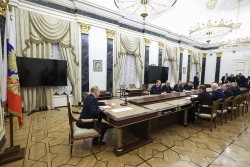how it can be improved.” This decision has raised concerns among Western countries and global security experts, who fear that Russia’s new nuclear doctrine could escalate tensions and increase the risk of nuclear conflict. The announcement comes at a time when global security concerns are already heightened due to the ongoing conflict in Ukraine, the rise of extremist groups, and the proliferation of nuclear weapons.
Paragraph 1
Russia’s revised nuclear doctrine is likely to have significant implications for global security. The country’s previous doctrine, which was last updated in 2014, emphasized the use of nuclear weapons as a last resort and only in response to a nuclear attack or a conventional attack that threatened the existence of the state. However, the new doctrine is expected to expand the circumstances under which Russia would consider using nuclear weapons, potentially lowering the threshold for their use. This shift in policy could lead to a more aggressive stance from Russia and increase the likelihood of a nuclear conflict.
Paragraph 2
The announcement of Russia’s revised nuclear doctrine has sparked concern among Western countries, particularly the United States and its allies in Europe. These countries fear that Russia’s new nuclear policy could destabilize the region and lead to a dangerous escalation of tensions. NATO Secretary-General Jens Stoltenberg has warned that any changes to Russia’s nuclear doctrine must be in line with international law and respect the principles of nuclear deterrence. The United States has also expressed its concerns, with Secretary of State Antony Blinken stating that Russia’s new nuclear doctrine could lead to a more dangerous and unpredictable security environment.
Paragraph 3
In addition to concerns about the implications of Russia’s revised nuclear doctrine, there are also questions about the motivations behind the decision. Some analysts believe that Russia’s announcement is a strategic move designed to assert its power and influence on the global stage. By changing its nuclear doctrine, Russia may be seeking to demonstrate its military capabilities and deter potential adversaries. Others suggest that the decision could be a response to perceived threats from NATO and Western countries, as well as a way to bolster domestic support for the government. Regardless of the motivations behind the decision, it is clear that Russia’s new nuclear doctrine has the potential to have far-reaching consequences for global security.
Conclusion
In conclusion, Russia’s announcement that it is changing its nuclear doctrine has raised concerns among Western countries and global security experts. The revised doctrine is expected to expand the circumstances under which Russia would consider using nuclear weapons, potentially increasing the risk of a nuclear conflict. The decision comes at a time of heightened global security concerns, with ongoing conflicts, the rise of extremist groups, and the proliferation of nuclear weapons. It is essential for the international community to closely monitor Russia’s new nuclear policy and work to prevent any escalation of tensions that could lead to a dangerous and unpredictable security environment.









